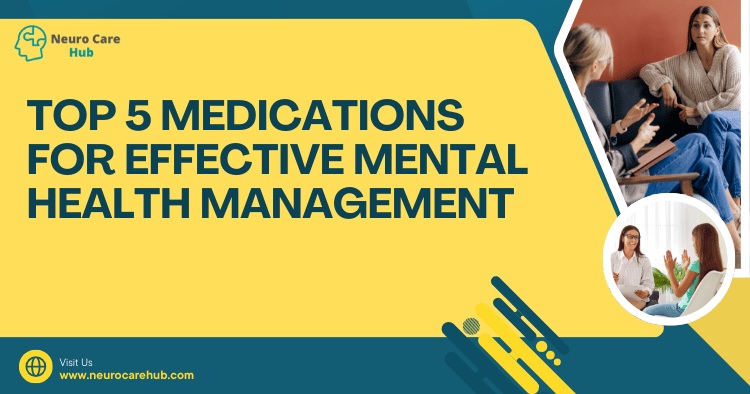Table of Contents
- Introduction
- Understanding Mental Health Disorders
- The Role of Medication
- Top 5 Medications for Mental Health Management
- Frequently Asked Questions
- Conclusion
- Resources
Introduction
Mental health disorders affect millions of people worldwide, impacting their quality of life, relationships, and overall well-being. As of 2024, the prevalence of these disorders continues to rise, necessitating effective management strategies. Medication plays a vital role in managing these conditions, often in conjunction with therapy and lifestyle changes. In this article, we will explore the top five medications used in mental health management, shedding light on how they work and what to expect.
“Understanding your mental health condition is the first step toward effective management.”
Understanding Mental Health Disorders
Mental health disorders encompass a range of conditions, including anxiety disorders, depression, bipolar disorder, and schizophrenia. Each disorder has its unique symptoms and challenges, which can vary in intensity and duration. It’s crucial to understand that these disorders are complex and often require a comprehensive treatment approach, which may include therapy, lifestyle changes, and medication.
“Mental health is not a destination, but a process. It’s about how you drive, not where you’re going.” — Anonymous
The Role of Medication
Medication can be a powerful tool in managing mental health disorders. It helps to alleviate symptoms, stabilize mood, and improve functioning. However, it’s essential to remember that medication is not a one-size-fits-all solution. Individual responses to medications can vary significantly, and finding the right medication often involves a process of trial and error under the guidance of a healthcare professional.
Benefits of Medication
- Symptom Relief: Many medications can effectively reduce or eliminate symptoms of mental health disorders.
- Improved Quality of Life: By managing symptoms, individuals can engage more fully in their daily lives.
- Stabilization: Medication can help stabilize mood and prevent relapses in conditions like bipolar disorder.
“Medications can be a vital part of mental health treatment, but they work best when combined with therapy and lifestyle changes.”
Risks and Considerations
- Side Effects: All medications come with potential side effects, which should be discussed with a healthcare provider.
- Dependency: Some medications, particularly benzodiazepines, can lead to dependency if not used correctly.
- Regular Monitoring: Patients may need regular check-ins with their healthcare provider to monitor effectiveness and side effects.
Top 5 Medications for Mental Health Management
1. Selective Serotonin Reuptake Inhibitors (SSRIs)
SSRIs are among the most commonly prescribed medications for depression and anxiety. They work by increasing the levels of serotonin in the brain, which is often linked to mood regulation.
Common SSRIs:
- Fluoxetine (Prozac)
- Sertraline (Zoloft)
- Escitalopram (Lexapro)
Benefits:
- Generally well-tolerated with fewer side effects than older antidepressants.
- Can also help with anxiety disorders.
Side Effects:
- Nausea, insomnia, and sexual dysfunction are common side effects.
“SSRIs can be a game-changer for those struggling with depression and anxiety, providing a pathway to emotional stability.”
2. Serotonin-Norepinephrine Reuptake Inhibitors (SNRIs)
SNRIs are another class of antidepressants that increase the levels of serotonin and norepinephrine, a neurotransmitter involved in mood and stress response.
Common SNRIs:
- Venlafaxine (Effexor XR)
- Duloxetine (Cymbalta)
Benefits:
- Effective for both depression and certain anxiety disorders.
- Can also help with chronic pain conditions.
Side Effects:
- May include increased blood pressure, nausea, and dizziness.
“SNRIs not only boost mood but can also tackle physical pain, offering dual relief for many patients.”
3. Antipsychotics
Antipsychotic medications are primarily used to treat schizophrenia and bipolar disorder but can also be beneficial for severe depression.
Common Antipsychotics:
- Risperidone (Risperdal)
- Olanzapine (Zyprexa)
- Quetiapine (Seroquel)
Benefits:
- Effective in stabilizing mood and reducing psychotic symptoms.
- Can be used in combination with antidepressants for treatment-resistant depression.
Side Effects:
- Weight gain, diabetes risk, and sedation are potential concerns.
“Antipsychotics can provide significant relief for those dealing with severe mental health conditions, but they require careful management.”
4. Mood Stabilizers
Mood stabilizers are often prescribed for individuals with bipolar disorder to help regulate mood swings and prevent episodes of mania and depression.
Common Mood Stabilizers:
- Lithium
- Lamotrigine (Lamictal)
- Valproate (Depakote)
Benefits:
- Proven effectiveness in managing bipolar disorder.
- May help with impulsivity and irritability.
Side Effects:
- Regular blood monitoring is needed for lithium, as it can affect kidney function.
“Finding the right mood stabilizer can be life-changing for those with bipolar disorder, helping to maintain balance and consistency.”
5. Benzodiazepines
Benzodiazepines are primarily used for short-term relief of severe anxiety symptoms and can be effective in treating panic attacks.
Common Benzodiazepines:
- Lorazepam (Ativan)
- Alprazolam (Xanax)
- Diazepam (Valium)
Benefits:
- Fast-acting relief for acute anxiety symptoms.
Side Effects:
- Risk of dependency, sedation, and impaired coordination.
“While benzodiazepines can provide quick relief, they should be used cautiously and typically not for extended periods.”
Frequently Asked Questions
Q: How long does it take for medication to work?
A: It varies, but most antidepressants take about 4 to 6 weeks to show their full effect. It’s essential to continue taking the medication as prescribed during this time.
Q: Can I stop taking my medication if I feel better?
A: It’s crucial to consult your healthcare provider before stopping any medication. Abruptly stopping can lead to withdrawal symptoms or a relapse of your condition.
“Always prioritize communication with your healthcare provider regarding medication adjustments for your safety and well-being.”
Q: Are there natural alternatives to medication?
A: While some individuals may benefit from therapy, lifestyle changes, or supplements like omega-3 fatty acids, these should be discussed with a healthcare provider.
Q: How do I know which medication is right for me?
A: Finding the right medication often involves trial and error. Work closely with your healthcare provider to monitor your symptoms and side effects.
“Every individual is unique, and so is the journey to finding the right medication for mental health management.”
Conclusion
Medication can be an essential part of managing mental health disorders, offering relief and improving overall quality of life. However, it’s important to approach medication with careful consideration and professional guidance. Always consult with a healthcare provider who can tailor a treatment plan that best suits your individual needs.
Resources
With the right support and treatment, individuals can navigate their mental health journeys more effectively and lead fulfilling lives.
Also look for:
For more insights on how mental health interconnects with neurological care, consider reading about Top 5 Reasons Neuro Care is Essential in Modern Medicine and Top 5 Ways Primary Physicians Enhance Neuro Care. Understanding the differences between neuro care and mental health care can also be beneficial; learn more in Neuro Care vs. Mental Health Care: Key Differences Explained.






